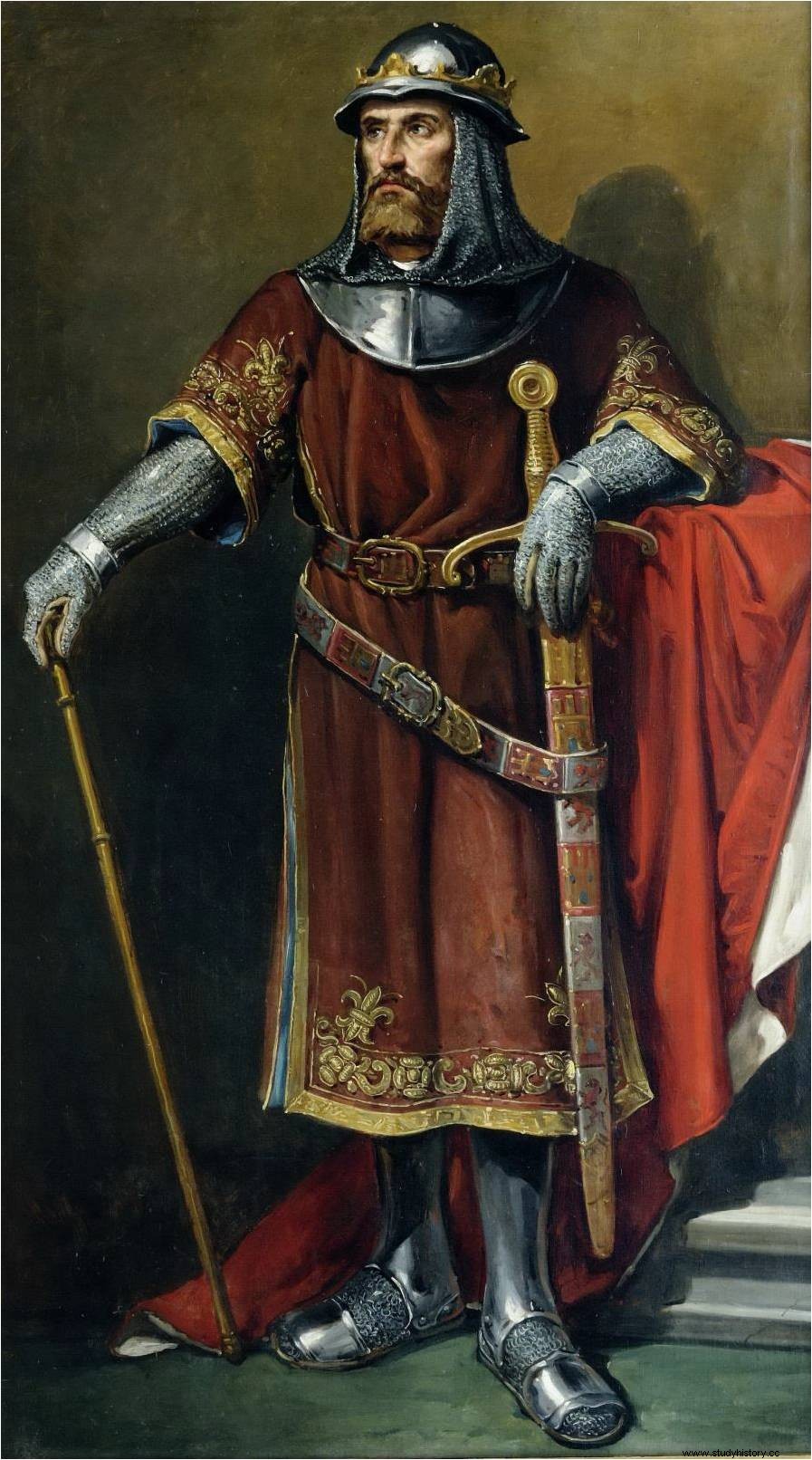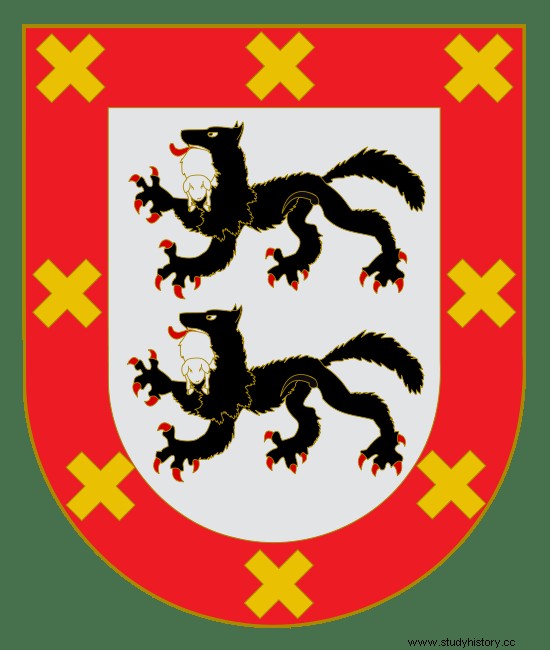If something happened regularly in Castile during the Middle Ages, it is that the kings are surrounded by nobles who seek to usurp their power and feel like kings without sitting on the throne. In this case we focus on the 13th century, and more specifically on the first years of the reign of Sancho IV . The one we know as the king “Bravo ”, He earned this nickname for his way of holding power, which the nobles of the kingdom of Castile suffered.
Sancho proclaimed himself heir to the Castilian throne in 1276 after the death of his brother Fernando de la Cerda. It is in 1278 when the oath of the heir is made in its most solemn terms and supported by his father, Alfonso X. By this time, Sancho already had a good number of nobles who supported his cause. Among them was Lope Díaz III de Haro , who must have seen in the infante Sancho the opportunity to create a family and political conflict in the Castilian Royal House through the relations of this prince with his father. Lope is positioned during these years as the main defender of the infant, hoping without a doubt to take advantage of it.

Imaginary portrait of Sancho IV (Ayto. León)
From 1282 to 1284 there is an uprising in Castile. Sancho, seeing that his father Alfonso is going to take away the inheritance of the royal throne in favor of his nephews the infantes de la Cerda, stands as legal heir and makes almost all the nobility, cities and military orders support him to be future King of Castile. Obviously, they all expected something in return, as well as favored treatment throughout his future reign. We see an example of this in the movements of Lope Díaz. The Count of Haro married Juana Alfonso de Molina, first cousin of Alfonso X, in 1269. Using the nobleman's family networks, in 1282, two marriages were celebrated that came to seal a pact:that of his brother Diego with a sister of Sancho, and that of Sancho with a sister of Juana. Marriage in the Middle Ages works as a good method to close agreements, and in this case we see that the Count of Haro was not going to stitch without a thread, since he left his family very close to the royal family. Here begins the count's takeoff, which means that he was also going to have a landing.
Lope Díaz obtained from King Sancho IV that his lineage reached its maximum political prominence. To do this, he made the king think that he was his most trusted man, his most faithful servant, when in reality he was only seeking his own benefit. As early as 1288, the count had managed to get the king to transfer to him exceptional powers over all the holdings of his castles and the administration of certain royal revenues. Both his brother Diego and him held positions of great power that allowed them to subtly frighten the king, since they were very powerful and could rise up against him and win. Thus, Lope earned a good number of enmities between the rest of the nobility and the court. They all coveted his power. Through this suspicious nobility of the Count of Haro, Sancho IV learned of the excesses committed by his private. Everyone was going to tell him about the maleficence that Haro was doing in Castile against the monarch. And it is true that there was a time when the count must have suffered from the fever of power, pretending to show himself with more power than the king himself, which made him very arrogant and haughty even in dealing with his majesty. 
Shield of the House of Haro
Thus, in 1288 everyone was able to observe the landing of Lope Díaz III de Haro (not to say that they saw him run as if there were no tomorrow to jump off a cliff), the king no longer seemed so bewitched by the count nor so weak.
In March of the aforementioned year, the Count of Haro makes one of his biggest mistakes by taking off his mask before his king. Lope and those loyal to him had dedicated themselves to sowing terror in the lands they controlled, including those owned by royal, so the monarch asked for explanations for these events that had reached his ears. The one from Haro would not be daunted and answered Sancho that yes, if any of his loyalists did anything for the Castilian lands it was because he himself had ordered it, making it clear that they were demonstrations of power so that the king would know that he should leave the kingdom in the hands of the worthy and not act on their own. At that moment Sancho did not know what to answer, he must have stayed as we would say today "checkered" before the count's impudence. Although he couldn't act properly at the time, he coldly planned revenge on him.
On June 8, 1288, the course of royal politics was going to change completely. Gathered in Alfaro several rich men and knights of the king, tried to agree the friendship of France or Aragon with Castile. This meeting was also attended by Lope Díaz and two of his closest loyalists: Diego López de Campos and the infant Juan , brother of Sancho IV. During the meeting, the count tried to take the lead and that everyone in the kingdom obey his orders. The king, tired of the humiliations suffered so far by his brother Juan and Lope, decided to leave the room where the meeting was held and let the nobles make the decision. Waiting for him, he must have made a mental plan and, when he went back in to find out the decision of his men from the kingdom, he went directly against Lope. According to the Chronicle, the conversation went something like this:
Have you agreed yet?
To which the count replied:
Yes, come in sir. Let's tell you.
So, since you already agreed, here I am with another agreement, and that is that you are going to stay here with me until you give me back my castles . – Sancho said, referring to the fact that he returned possession of his fortresses.
Don Lope, who no longer knew what shame was, much less the respect he owed to his monarch, got up angrily:
Prisoners? How? Fuck it! Oh mine!
That is to say, that he proposed to his loyal ones that they rise up next to him to stand up to the king. As the count spoke, he drew a knife and hurried over to where the monarch was. Sancho, who was no longer cowering, unsheathed his knife. But the monarch must have been nervous before so much emotion, he stepped on his clothes and fell face down on the ground. Those loyal to the monarch pounced on Lope and, with all the delicacy that they presumed to have in these times, cut off the nobleman's armed hand with a single blow. Sancho recovered at once and, in a matter of seconds, took a mace and set out to hunt down Lope... the count died from a blow to the head with a hammer . After this, the monarch cornered Diego López de Campos and rebuked him for having helped the count:
Diego, why do I deserve this from you? Why do you run around my land if you are my vassal?
Diego must have been in shock, so he did not answer for better or for worse, which also provoked the king's anger. Sancho quickly unsheathed his sword and killed the nobleman with a single blow. Meanwhile, the infante Juan had dedicated himself to waging war on his behalf, wounding a couple of people who were gathered there. Sancho could no longer see, he was blinded by rage, and he headed toward his brother Juan, sword in hand. The infant was lucky that just at that moment the queen appeared, María de Molina , and she was able to placate her fiery husband. Juan ended up in irons, that is, imprisoned in a kind of dungeon and later exiled from Castile. And Sancho earned his nickname: Sancho IV El Bravo .
Collaboration with Leonor Parra Aguilar
